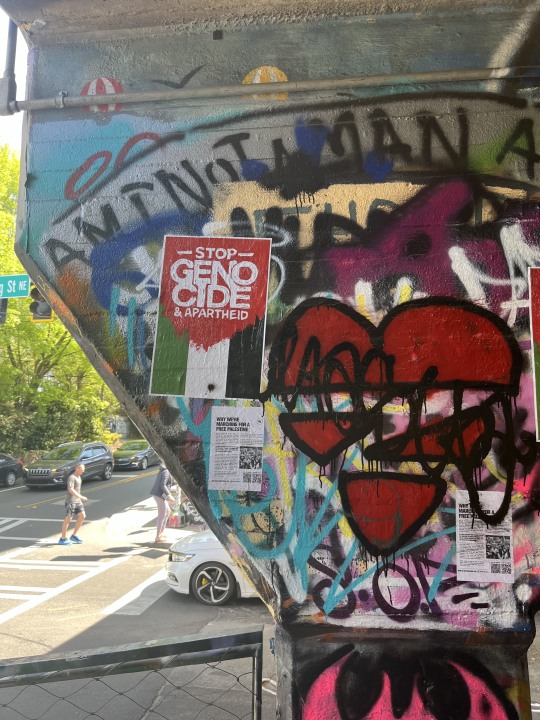Text
Getting to Know Atlanta Thru Its Graffiti
By Isabel De Los Santos Ramirez
Having an assignment like this, where I had the opportunity to connect with classmates outside of the classroom doing something as simple as walking and looking at art was such a relief. I had fun and learned more about Atlanta and the ways people feel through art. Graffiti is one of the many ways an individual can reclaim space and express feelings, including resistance, without really hurting anyone. I think it is appealing to the eye and definitely serves its purpose of evoking emotion. I once heard someone say “you can’t really know and appreciate a city until you know and appreciate its graffiti”, so I am now at peace with having seen fragments of the graffiti in Atlanta as I will be living here for a while. During the walk I saw many different kinds of people and different types of graffiti, but, wow, the juxtaposition of it all being in the same space made everything much more significant. Here are some of my favorite works from that day:








3 notes
·
View notes
Text
Brainwashing in Conflict: Palestine and Israel
By Isabel De Los Santos Ramirez
During the film screening of Israelism offered by Georgia Tech’s Muslim Student Association, a diverse set of emotions arose in me. Before coming into this, I was always up to date with news on social media and would say I was already well informed of the history and devastation that has been occurring from Jewish settlements in the land that Palestians call home. What I did not know, and honestly found extremely shocking, is the Israeli culture of raising Jewish children in a way that makes their entire personality about Israel. In a way that I would say even overshadows practicing Judaism. To the extreme that Jewish-American teenagers choose to go to a country they have most likely never been to in order to serve in the military as an attempt to express patriotism.
Relating to the filming aspects of the documentary, I enjoyed the way the film progressed and how everything was introduced and expanded upon. For example, the main characters telling their story of how they were raised and how they experienced the real world for themselves which lead to them growing out of the “brainwashing” inflicted upon them by older zionist leaders in their communities. I appreciate the different perspectives on the Palestine-Israel situation. I had no idea some Jewish communities took such extremities in beliefs and nationalism. Just from this, I learned that we are not who we are raised to be. Anyone can change their way of thinking, their way of loving, their way of respecting, their way of having hope, their way of being a human being. It might take a tap on the shoulder or getting hit by a garbage truck, but it is possible.
For example, Simone Zimmerman, one of the main characters in Israelism, went from being a conservative Zionist to an activists for Palestinian Liberation who founded IfNotNow, which is a “movement of American Jews organizing community to end U.S. support for Israel's apartheid system and demand equality, justice, and a thriving future for all Palestinians and Israelis”.
Since this watching experience, I have learned a lot more from class, the news on social media, books (Minor Detail), podcasts, and other short films. I can’t help but to feel anger and helplessness about not being able to do something that will have an immediate impact to make things better. I know liberation and peace take time and loss, but for what reason? I don’t think I will ever understand.
After the screening of Israelism I expanded my research by watching these videos:
youtube
youtube
0 notes
Text
Rebranding a College English Class
By Kelechi Nwaozuzu, Romulus Khalil, Elizabeth Adams, Carlotta Bresciani, Isabel De Los Santos Ramirez, Dylan Brank, Laksh Makhija, Aditi Umapathy, Tianze Qiu, Noah Pearce
Language in Classrooms (Dylan & Jeffery):
Things Fall Apart → Colonial History of English class
English taught in schools around the world as the “unifying language”/language of business
Why aren’t more languages accepted in the classroom/business setting?
Incorporation of dialects and sub-languages
English incorporated as an elective class rather than a core class
Teacher-Student Relationship (Romulus & Noah):
The teacher should be delegated to a minor role in the classroom.
Students should educate and lead themselves.
The teacher gives topics and resources; the students will take control from there.
If students are observed straying from the topic, teachers have the right to steer them back onto topic.
Assignment Structure (Aditi & Isabel):
There shall be no graded assignments.
The assignments should encourage a creative mentality and allow the students to express themselves freely. For example, students can write essays in their mother tongue or perform native dances.
Books and poems shall heavily include non-American authors and writers, allowing students to increase their global perspective.
No strict guidelines shall be enforced on grammatical structure and “sophisticated” language. Colloquial language and slang shall be encouraged to increase language diversity and decrease cultural barriers associated with broken English. Advantages include increasing student interest and helping increase cultural awareness and sensitivity, which allows non-native speakers to connect with native speakers on a deeper level.
Students shall be able to choose the books to read and movies to watch. This allows students to engage in their interests while being in a learning environment relating to classroom topics and themes.
Physical Appearance of Classroom (Carlotta & Elizabeth):
The seating should be non-traditional to encourage openness and communication. Example: Bean bags, conversion pit, couches, etc.

The teacher is not in the front of the room but is among the students to encourage more of a discussion rather than a lecture environment.
Whenever the majority of students want the class to go outside it will be.
The classroom is student-decorated and decorated by student work.
Grading (Kelechi):
Students should be penalized no more than 5 points on an assignment for grammatical errors. In a typical “English” class, more likely than not, there will be students who did not learn English as their first language. Thus, they are at a disadvantage grammatically, compared to other students who learned English as their primary language. Furthermore, the creativity of a student’s work should not be punished due to a few typos and misspellings.
Students must be given a chance to receive feedback on their work before being graded. Effective feedback improves students’ learning patterns and helps them connect their learning and practices with the grades they receive.
Reflection
In our Manifesto, we wrote a commandment style list of rules for our ideal college English class. These included but are not limited to sections about Language in the Classroom, Teacher-Student Relationships, Assignment Structure, Physical Appearance of Classroom, and Grading. Each section has rules to be followed which were thought of collaboratively between one or two of our group members (names follow each section). Our list of rules uses strong and demanding language that some might find as a challenge, which is what we hope to achieve since this is a Manifesto with the main goal being to articulate a radical change, to organize, to create a rallying cry and liberate.
This assignment was part of the wider aim of our English class to punch up against colonialism and the societal norms that have been set by Western colonizers decades ago. By changing the classroom environment, student empowerment is promoted creating a shift in power from the teacher to the students, colonialist ideals are no longer perpetuated by incorporating dialects and sub-languages and a more inclusive, open and communicative environment is created for critical thinking based learning.
Most of our bullet points were biased to what we believe would be the ideal classroom environment that we would dream to learn in, especially in a course as flexible as a language arts class.
While everyone contributed their ideas and writing of the rules, the labor for the group was divided as such:
Rabble Rouser: Romulus
Representatives: Carlotta, Laksh
Research Team: Dylan, Jeffery, Isabel
Design Team: Noah, Aditi
Skeptic: Kelechi, Elizabeth
Sources
Language:
Things Fall Apart (Canvas)
https://hbr.org/2012/05/global-business-speaks-english
Assignments:
https://theeducatorsroom.com/exploring-non-traditional-education-in-the-classroom/
https://www.jstor.org/stable/811692?seq=3
https://global-lt.com/blog/understanding-the-impact-of-slang-on-language-learning
Physical Appearance:
http://www.literacylovescompany.com/2017/07/flexible-seating-pros-and-cons.html4
https://pin.it/4GxRB2P34
https://www.theguardian.com/teacher-network/2015/feb/11/schools-students-traditional-teaching
Grading:
Eight Essential Principles for Improving Grading (ascd.org)
0 notes
Text
Our Take on Feminism
By Isabel and Terrence
What does Feminism mean to you? How do you connect to it?
Isabel: To me, Feminism means the equality between all genders in regarding work, career, health access, and societal pressures. This means that equal opportunities and experiences are achievable by both those who identify as men, women, and other gender identities. But sometimes this can be complicated, for example just because different groups of people are allocated the same resources and opportunities does not mean that they are given fair or equal advantages over another group. This raises the question of equality vs equity. So I guess my answer would instead be that feminism, to me, means the equity of treatment for all genders solely based on gender identity. While I do believe feminism has some characteristics regarding equity between races and classes, which are also very important, that is not its main focus????
Terrence: Feminism to me means treating all people the same regardless of gender, recognizing that everyone deserves equal rights, opportunities, and respect. It's about dismantling societal norms and expectations that limit individuals based on their gender, and creating a world where everyone has the freedom to pursue their goals and aspirations without discrimination. True feminism seeks to create a society where diversity and inclusivity thrive, where individuals are valued for their abilities and character rather than being confined by traditional gender roles. With me growing up with women and embracing feminism from a young age, I believe in advocating for the rights and empowerment of all, fostering a world where equality knows no boundaries, and where each person can flourish regardless of their gender identity.
What is an example of feminism you have experienced in your life? How does feminism affect you?
Terrence: Growing up in a household with women exposed me to both the strength of women and the importance of feminism. With my dad taking long trips abroad for work, I grew up in the hands of my grandmother and mother. Similarly, I watched some of my cousins on my dad’s side grow up in households headed by single mothers. I first-hand experienced how, despite not having a man consistently physically present in our household, the women in my life were able to fill these roles in both me and my sisters’ lives. Growing up taught me that a woman is capable of doing everything that a man can. Given this, imagine my shock to find out the need for the feminist movement. How could you tell me men and women aren’t equal? My upbringing says otherwise…
Isabel: While I am a woman, I never knew about feminism until late high school. Looking back onto my girlhood, I do have experiences where I was treated differently solely on the fact that I was a girl. I was perceived as more sensitive, less qualified in school and sports, and expected to always be on my best behavior. Being Latina made a difference in these experiences as I grew up in majority non-Latino communities. It somehow allowed people to think they had the right to push me over, including my classmates and some immature adults. So yes, in my short life I have had uncalled for experiences with misogynists. Due to this, I make it a mission to help raise my brother and future children into people who are respectful and view women, as well as others, as equals.
What are some examples of traditional gender roles you have heard of or experienced growing up? How can we go against these?
Isabel: Whew, maaaaany. I’ve been told by my family members that I shouldn’t dress a certain way, “you look like a man in that clothes”, that I should style my hair a certain way, “long hair would make you look more like a girl”, that I should behave a certain way, “don’t be loud or talk back, act like a lady”, that I should engage in certain activities, “go clean and cook”. While I do enjoy girly outfits, having long hair, being quiet, cooking, cleaning, and being around babies, being told all of these things makes me want to do the opposite of what is expected. Maybe I just enjoy rebelling and creating chaos??? On the other hand, I have also heard family members say similar things to my guy cousins. “Where are the h*es?”, “when are you getting a house?”, “get to work, you’re lazy”, “Help me fix this”, or “don’t cry, be a man”.
Terrence: I will personally say that I’m lucky to have grown up in a family that values women for who they are and encourages freedom and equality. A few gender roles I see outside that I’ve seen my family work to correct in our household include cooking/cleaning, sports, and emotional expression. From a young age, my parents worked to teach me and my sister how to cook and clean, emphasizing how everyone ought to know how to care for themselves, despite them being traditionally feminine tasks. Similarly, my parents enrolled both me and my sister in sports, emphasizing how everyone ought to take care of their bodies, despite it being a traditionally masculine activity. Additionally, my parents encouraged both me and my sister to learn how to express and articulate ourselves emotionally, despite emotional displays being a traditionally feminine act.
How would you like to see the feminist movement grow?
Terrence: What I want to see is simple. I want to see the women of today and tomorrow treated equally. I want to see gender roles as less of a social construct and more of roles assigned to individuals based on their skills and interests. Isabel: Like Terrence, I also want to see the women of today and of the near future treated in a way that allows them to have the same opportunities and experiences as men without having to go out of their way to make it possible. I would also like to see the movement grow as a community that is more inclusive and less anti-men. I know not every feminist is anti-men, but there are many feminist that fit this trope and create a stereotype for other feminist.
Conclusion
Both Isabel & Terrence: To us, feminism is the idea and upholding of equality between all genders. Feminism, to us, means not having to worry about ourselves nor the women around us facing additional life challenges on the basis of factors outside of their control. Throughout both of our life experiences up to now, we relate to the idea that feminism has a room in both of our families as there are prominent gender roles associated with our cultures and familial beliefs. For example, men are generally regarded as strong, dominant leader figures charged with decision making where women, on the other hand, are generally regarded as subservient and caretakers/nurturers. Although biological factors play a role in the skills and traits acquired by each gender, it is the rigid societal barriers, which turn these differences in biological factors into blatant sexism.

0 notes
Text
Paving the Way a Million Miles at a Time
By: Isabel De Los Santos
"Ingredient no. 1: find your goal. Ingredient no.2: know how far you are. Ingredient no. 3: draw a road map. Ingredient no. 4: if you don't know how, learn. Ingredient no. 5: when you think you've made it, you probably have to work harder"- Salvador Hernandez, A Million Miles Away (2023)

In the film, A Million Miles Away (2023), director Alejandra Marquez Abella, from San Luis Potosi, Mexico, tells the story of Jose M Hernandez and how his goal of becoming an astronaut became his reality through hard work and tremendous sacrifices. In telling the story, she uses techniques that are not commonly seen in films such as the warping of some scenes to express defeat, but not surrender, and the use of different camera quality for memorable scenes and the passing of time, such as the scene where Jose and Adela, his partner, are married and later start their family—one of my favorite scenes!
The film explores themes of resilience, determination, community, and Mexican/Mexican-American culture. Jose, like many Mexican-Americans including myself, was born to immigrant parents who came to the United States in hopes of achieving the "American Dream", or at least having a taste of it by earning higher wages compared to in Mexico. The film A Million Miles Away begins with the farewell of Salvador and Julia, Jose's parents, and their children as they leave Mexico to work on Californian farms in hopes of saving enough money to build a house in their hometown in Michoacan, Mexico. Once in the US, Jose has to help his parents work the farms early in the morning then head to school, where he excels in math.
A very important character in Jose's story is his elementary teacher, Ms. Young, who believes in him and in his goal. Because of her, Salvador was convinced to stay in one place instead picking up his family and moving every few months with the harvest, "How can a tree grow fruit when it is being uprooted and replanted every three months?" she asked.
The film fast forwards to Jose finding love, graduating college, and finally resumes when he has his first job as a lab engineer for a federal research facility. Here, he is a minority, and seen as unqualified at the beginning. For example, the secretary assumes Jose to be the new janitor despite him wearing dress clothes like all the other engineers at the facility. Although he is discouraged, he does not give up; in fact he works harder to get what he wants to achieve.
Marquez Abella, expresses storytelling through film in a way that honored Jose's story. She uses iconic Norteña music, and other iconic Mexican/Mexican-American songs that fit the corresponding scene perfectly. There is also a specific scene near the end where Jose is close to accomplishing his goal and has flashbacks to conversations with his loved ones where they are encouraging and motivating him, but this time said characters break the fourth wall and are speaking to the audience. This was clever and moving, it inspires the audience and builds a closer connection with the characters.
The use of “chapters” throughout the film which follow Salvador’s receta, or recipe, keep the viewer engaged and wanting to take notes–at least it did when I watched it the first, second, and third time. Overall, the movie evokes emotion and awe, furthermore it evoked a personal connection because I share similar experiences with sacrifices, food, music, being Mexican-American, and having closely related goals.
“Who better to leave this planet and dive into the unknown than a migrant farmworker?” - Beto, A Million Miles Away (2023)
Sources:
youtube
youtube
Film Soundtrack:
#NASA#Mexico#ProtectFarmworkers#FirstGen#Astronaut#JoseMHernandez#Education#Community#California#LosTigresDelNorte#Youtube
0 notes
Text
Pro-Colonialism Propaganda: How Do We See The Effects Today?
We are living in the remains of colonialism, such colonialism that is not even two hundred years old. For example the overtaking and cultural assimilation of the Philippines during the late 1800s and early 1900s as a result of the Spanish-American War, which eventually led to the Filipino-American War. These catastrophic events in history were primarily caused by the ideas of manifest destiny sought after the United States as an imperial power. Its greed for territorial land and control shaped the lives of the native people of those lands in ways unimaginable.
During this time, many artists captured the history of the ideas and emotions the imperial powers wanted others to consume, believe, and uphold. They used visual rhetoric through extreme exaggeration and corruption.

The political cartoon above, which was seen on a Judge magazine cover in June of 1899, was used as propaganda after the Spanish-American war was over and the United States was given control over the Philippines, Guam, Cuba, and Puerto Rico from Spain through the passing of the Treaty of Paris. This piece displays a crying, naked, indigenous Filipino child with an arrow in his hand being given his "first" bath by William McKinley, the U.S. president at the time. In this "first bath," the child is being washed using the waters of "civilization" and the brush of "education". In the background, there are two other children, who represent Cuba and Puerto Rico, who appear to have already been bathed as they have Americanized clothes on and no noticeable traditional attire.
The visual presence of the American Flag in the new clothes of the recently acquired territories and what appears to be the White House in the background create a sense of patriotism in the image. This might invoke the intended audience to believe what the U.S. is doing, especially President McKinley exclaiming “Oh, you dirty boy!”, is only doing what is best for the people of those lands. The ideas of Rudyard Kipling’s poem "The White Man's Burden" are exemplified through this and many similar propaganda posters. Such as this:

And this:

And this:

Grant Hamilton, Judge Magazine, 14 December 1902
All of these propaganda posters are racist and meant to harm the people from these places who had establishments, systems of governance, skills, labor, vegetation, and cultural traditions that were already allowing them to live and thrive. Visual media like this, even used today, create generalizations and harmful ideas to the people consuming them on a daily. But, that gives us the opportunity and duty to punch up against it!
#postcolonialism#anticolonialism#spanishamericanwar#thePhilippines#nowhitemansburden#history#punch up
6 notes
·
View notes